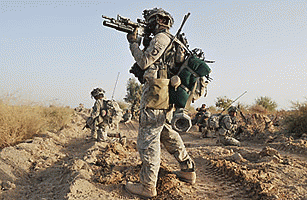Last December I remember wondering if President Barack Obama had the political courage to order our troops home from Afghanistan. Now, that would have earned him a peace prize. However, instead, Obama escalated the war by offering up an additional 30,000 U.S. soldiers to defend one of the most corrupt regimes on the planet.
Obama then made a bad decision worse by adding a July 2011 "target" date to begin withdrawal in an obvious attempt to assuage his base. Assuming Obama was truly sincere about winning the war, announcing a drawdown date seemed counterproductive at the time, which unfortunately proved to be very true. Unfortunately, Obama's aides have just recently been struck by this reality or so it appears, according to McClatchy:
Another [Obama] official said the administration also realized in contacts with Pakistani officials that the Pakistanis had concluded wrongly that July 2011 would mark the beginning of the end of U.S. military operations in Afghanistan.
That perception, one Pentagon adviser said, has convinced Pakistan's military -- which is key to preventing Taliban sympathizers from infiltrating Afghanistan -- to continue to press for a political settlement instead of military action.
"This administration now understands that it cannot shift Pakistani approaches to safeguarding its interests in Afghanistan with this date being perceived as a walk-away date," the adviser said.
Indeed, where do the Pakistanis get their insane ideas? Well, we need not worry about the July 2011 date any longer for at next week's Lisbon conference a new plan to withdraw U.S. and NATO forces by 2014 will be outlined so say these same Obama officials.
However, now that General David Petraeus supposedly finally has all of his "inputs" right and is making gains on the ground in places like Kandahar's "heart of darkness", a senior military office said "right now there is a gap between security gains and governance."
The crux of the problem does not lie in Kandahar, nor does it reside in D.C. or Islamabad it sits in Kabul, for the government of President Hamid Karzai has enabled the reemergence of the Taliban like no other factor, and even if the U.S. told Pakistan it wasn't ever leaving Afghanistan, Pakistani officials would still be hell-bent on hedging their bets because of their colossal mistrust of the Afghan government, whom they see as illegitimate, corrupt, ineffective, unreliable and unpredictable.
According to a recent white paper by the New America Foundation, disillusionment in the countryside with the Afghan government allowed the Taliban to resurrect from Pakistan. The Taliban resurgence was neither inevitable nor preordained. It took time to grow - with Karzai's unwitting assistance. From 2001 to 2004 the group resuscitated in Pakistan and was able to do so because Karzai and his family alienated and rejected Taliban commanders that had surrendered who were willing to peacefully coexist. Instead, they sought refuge in Quetta.
Between 2004 and 2006, the Taliban movement burgeoned as it amassed a swell of rank-and-file recruits who had become totally disenchanted with government institutions described as "predatory and divisive, corrupt to the core, and completely ineffective in meeting basic needs." As Anand Gopal wrote:
For these reasons, it took some time for the Taliban to regroup, for former leaders to grow disaffected and flee to Pakistan, and for the various factors that alienated communities to play out. Sizable opposition did not emerge until 2003, and the insurgency did not gain significant momentum until after 2004, when community after community began falling to the Taliban.
In post-2011 Kandahar - the birthplace, spiritual cradle and nerve center of the Taliban movement - Karzai crony Gul Agha Sherzai became governor and grievously tortured former Taliban commanders in secret prisons. Elders in Panjwayi district claim that nearly every former mid-level Taliban commander, along with their relatives and friends, fled Afghanistan in the first years of the Sherzai government and have joined the insurgency.
Then the government became even more pernicious after Sherzai left and Ahmed Wali Karzai, President Hamid Karzai's half-brother, consolidated power over the province and now runs it like a mob boss. Ahmed Wali dominates a wanton patronage system as well as the licit and illicit trade networks while he ruthlessly eliminates his opponents.
Local law enforcement is so corrupt that the Taliban have been able to position themselves as protectors of the population against the police. The Taliban also take advantage of an inept court system. In Kandahar city, for instance, there are only nine judges out of 87 possible slots, and where they do exist, the system is "laboriously slow, ineffective, and very susceptible to bribery."
The Karzai government at every level also heinously discriminated across tribal lines, according to Gopal:






